Willie Neiswanger
Department of Computer Science, Stanford University
Neural Nonmyopic Bayesian Optimization in Dynamic Cost Settings
Jan 10, 2026Abstract:Bayesian optimization (BO) is a common framework for optimizing black-box functions, yet most existing methods assume static query costs and rely on myopic acquisition strategies. We introduce LookaHES, a nonmyopic BO framework designed for dynamic, history-dependent cost environments, where evaluation costs vary with prior actions, such as travel distance in spatial tasks or edit distance in sequence design. LookaHES combines a multi-step variant of $H$-Entropy Search with pathwise sampling and neural policy optimization, enabling long-horizon planning beyond twenty steps without the exponential complexity of existing nonmyopic methods. The key innovation is the integration of neural policies, including large language models, to effectively navigate structured, combinatorial action spaces such as protein sequences. These policies amortize lookahead planning and can be integrated with domain-specific constraints during rollout. Empirically, LookaHES outperforms strong myopic and nonmyopic baselines across nine synthetic benchmarks from two to eight dimensions and two real-world tasks: geospatial optimization using NASA night-light imagery and protein sequence design with constrained token-level edits. In short, LookaHES provides a general, scalable, and cost-aware solution for robust long-horizon optimization in complex decision spaces, which makes it a useful tool for researchers in machine learning, statistics, and applied domains. Our implementation is available at https://github.com/sangttruong/nonmyopia.
Hubble: a Model Suite to Advance the Study of LLM Memorization
Oct 22, 2025Abstract:We present Hubble, a suite of fully open-source large language models (LLMs) for the scientific study of LLM memorization. Hubble models come in standard and perturbed variants: standard models are pretrained on a large English corpus, and perturbed models are trained in the same way but with controlled insertion of text (e.g., book passages, biographies, and test sets) designed to emulate key memorization risks. Our core release includes 8 models -- standard and perturbed models with 1B or 8B parameters, pretrained on 100B or 500B tokens -- establishing that memorization risks are determined by the frequency of sensitive data relative to size of the training corpus (i.e., a password appearing once in a smaller corpus is memorized better than the same password in a larger corpus). Our release also includes 6 perturbed models with text inserted at different pretraining phases, showing that sensitive data without continued exposure can be forgotten. These findings suggest two best practices for addressing memorization risks: to dilute sensitive data by increasing the size of the training corpus, and to order sensitive data to appear earlier in training. Beyond these general empirical findings, Hubble enables a broad range of memorization research; for example, analyzing the biographies reveals how readily different types of private information are memorized. We also demonstrate that the randomized insertions in Hubble make it an ideal testbed for membership inference and machine unlearning, and invite the community to further explore, benchmark, and build upon our work.
Probabilistic Graphical Models: A Concise Tutorial
Jul 23, 2025Abstract:Probabilistic graphical modeling is a branch of machine learning that uses probability distributions to describe the world, make predictions, and support decision-making under uncertainty. Underlying this modeling framework is an elegant body of theory that bridges two mathematical traditions: probability and graph theory. This framework provides compact yet expressive representations of joint probability distributions, yielding powerful generative models for probabilistic reasoning. This tutorial provides a concise introduction to the formalisms, methods, and applications of this modeling framework. After a review of basic probability and graph theory, we explore three dominant themes: (1) the representation of multivariate distributions in the intuitive visual language of graphs, (2) algorithms for learning model parameters and graphical structures from data, and (3) algorithms for inference, both exact and approximate.
Zebra-CoT: A Dataset for Interleaved Vision Language Reasoning
Jul 22, 2025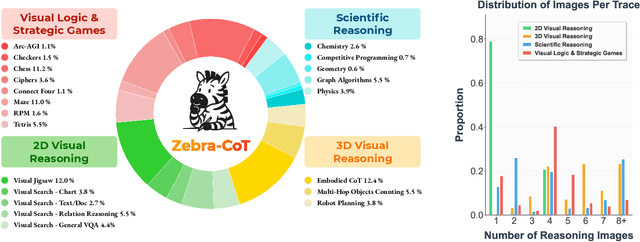

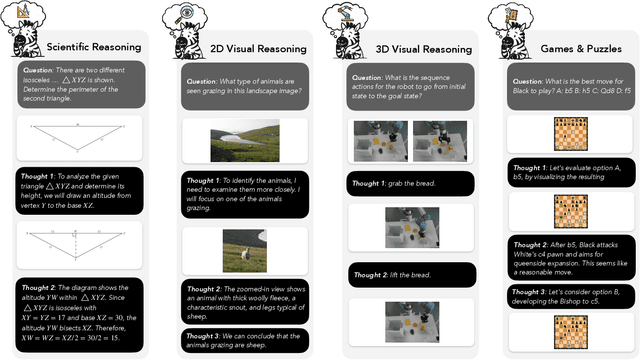

Abstract:Humans often use visual aids, for example diagrams or sketches, when solving complex problems. Training multimodal models to do the same, known as Visual Chain of Thought (Visual CoT), is challenging due to: (1) poor off-the-shelf visual CoT performance, which hinders reinforcement learning, and (2) the lack of high-quality visual CoT training data. We introduce $\textbf{Zebra-CoT}$, a diverse large-scale dataset with 182,384 samples, containing logically coherent interleaved text-image reasoning traces. We focus on four categories of tasks where sketching or visual reasoning is especially natural, spanning scientific questions such as geometry, physics, and algorithms; 2D visual reasoning tasks like visual search and jigsaw puzzles; 3D reasoning tasks including 3D multi-hop inference, embodied and robot planning; visual logic problems and strategic games like chess. Fine-tuning the Anole-7B model on the Zebra-CoT training corpus results in an improvement of +12% in our test-set accuracy and yields up to +13% performance gain on standard VLM benchmark evaluations. Fine-tuning Bagel-7B yields a model that generates high-quality interleaved visual reasoning chains, underscoring Zebra-CoT's effectiveness for developing multimodal reasoning abilities. We open-source our dataset and models to support development and evaluation of visual CoT.
Resa: Transparent Reasoning Models via SAEs
Jun 11, 2025Abstract:How cost-effectively can we elicit strong reasoning in language models by leveraging their underlying representations? We answer this question with Resa, a family of 1.5B reasoning models trained via a novel and efficient sparse autoencoder tuning (SAE-Tuning) procedure. This method first trains an SAE to capture reasoning abilities from a source model, and then uses the trained SAE to guide a standard supervised fine-tuning process to elicit such abilities in a target model, all using verified question-answer data without any reasoning traces. Notably, when applied to certain base models before further RL post-training, SAE-Tuning retains >97% of its RL-trained counterpart's reasoning performance while reducing training costs by >2000x to roughly \$1 and training time by >450x to around 20 minutes. Furthermore, when applied to lightly RL-trained models (e.g., within 1 hour on 2 GPUs), it enables reasoning performance such as 43.33% Pass@1 on AIME24 and 90% Pass@1 on AMC23 for only around \$1 additional cost. Surprisingly, the reasoning abilities extracted via SAEs are potentially both generalizable and modular. Generality means abilities extracted from one dataset still elevate performance on a larger and overlapping corpus. Modularity means abilities extracted from Qwen or Qwen-Math can be attached to the R1-Distill model at test time, without any retraining, and yield comparable gains. Extensive ablations validate these findings and all artifacts are fully open-sourced.
From Calibration to Collaboration: LLM Uncertainty Quantification Should Be More Human-Centered
Jun 09, 2025Abstract:Large Language Models (LLMs) are increasingly assisting users in the real world, yet their reliability remains a concern. Uncertainty quantification (UQ) has been heralded as a tool to enhance human-LLM collaboration by enabling users to know when to trust LLM predictions. We argue that current practices for uncertainty quantification in LLMs are not optimal for developing useful UQ for human users making decisions in real-world tasks. Through an analysis of 40 LLM UQ methods, we identify three prevalent practices hindering the community's progress toward its goal of benefiting downstream users: 1) evaluating on benchmarks with low ecological validity; 2) considering only epistemic uncertainty; and 3) optimizing metrics that are not necessarily indicative of downstream utility. For each issue, we propose concrete user-centric practices and research directions that LLM UQ researchers should consider. Instead of hill-climbing on unrepresentative tasks using imperfect metrics, we argue that the community should adopt a more human-centered approach to LLM uncertainty quantification.
Auditing Black-Box LLM APIs with a Rank-Based Uniformity Test
Jun 08, 2025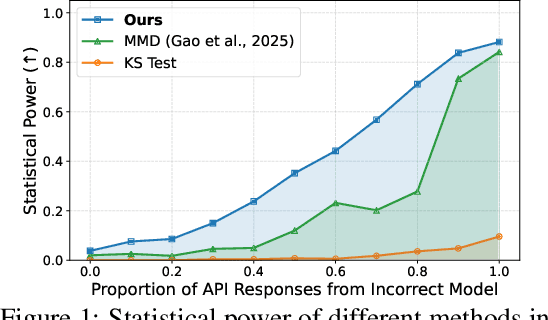
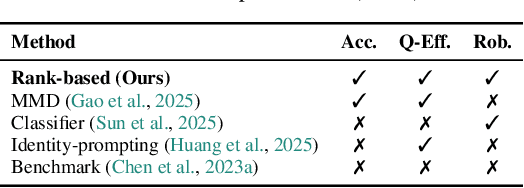
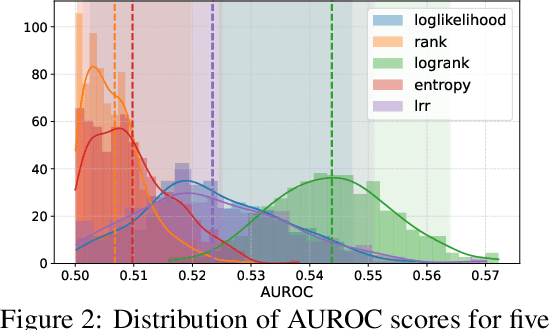

Abstract:As API access becomes a primary interface to large language models (LLMs), users often interact with black-box systems that offer little transparency into the deployed model. To reduce costs or maliciously alter model behaviors, API providers may discreetly serve quantized or fine-tuned variants, which can degrade performance and compromise safety. Detecting such substitutions is difficult, as users lack access to model weights and, in most cases, even output logits. To tackle this problem, we propose a rank-based uniformity test that can verify the behavioral equality of a black-box LLM to a locally deployed authentic model. Our method is accurate, query-efficient, and avoids detectable query patterns, making it robust to adversarial providers that reroute or mix responses upon the detection of testing attempts. We evaluate the approach across diverse threat scenarios, including quantization, harmful fine-tuning, jailbreak prompts, and full model substitution, showing that it consistently achieves superior statistical power over prior methods under constrained query budgets.
Textual Steering Vectors Can Improve Visual Understanding in Multimodal Large Language Models
May 20, 2025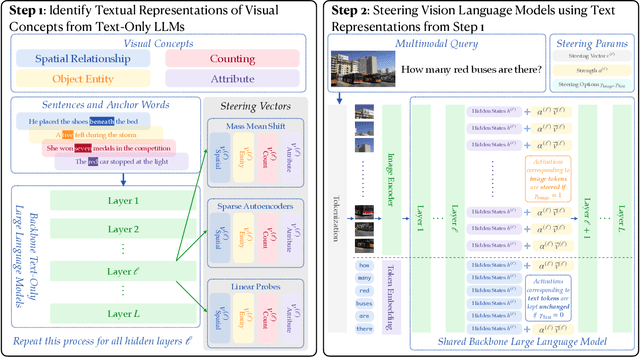
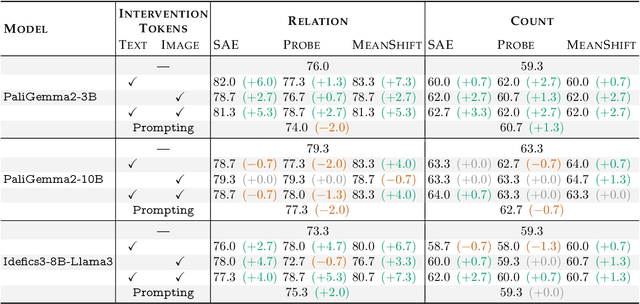
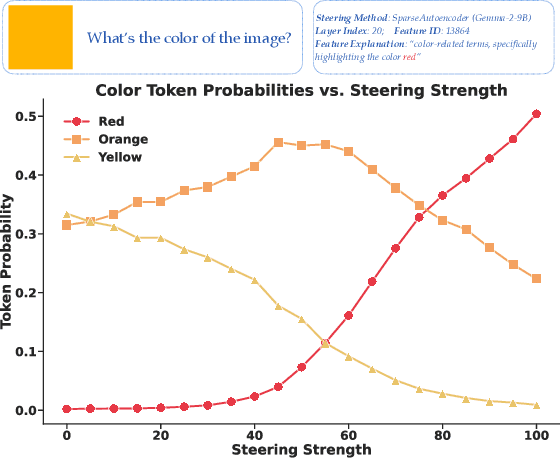
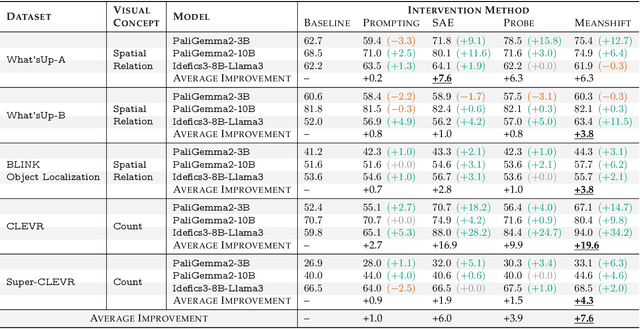
Abstract:Steering methods have emerged as effective and targeted tools for guiding large language models' (LLMs) behavior without modifying their parameters. Multimodal large language models (MLLMs), however, do not currently enjoy the same suite of techniques, due in part to their recency and architectural diversity. Inspired by this gap, we investigate whether MLLMs can be steered using vectors derived from their text-only LLM backbone, via sparse autoencoders (SAEs), mean shift, and linear probing. We find that text-derived steering consistently enhances multimodal accuracy across diverse MLLM architectures and visual tasks. In particular, mean shift boosts spatial relationship accuracy on CV-Bench by up to +7.3% and counting accuracy by up to +3.3%, outperforming prompting and exhibiting strong generalization to out-of-distribution datasets. These results highlight textual steering vectors as a powerful, efficient mechanism for enhancing grounding in MLLMs with minimal additional data collection and computational overhead.
Tina: Tiny Reasoning Models via LoRA
Apr 22, 2025Abstract:How cost-effectively can strong reasoning abilities be achieved in language models? Driven by this fundamental question, we present Tina, a family of tiny reasoning models achieved with high cost-efficiency. Notably, Tina demonstrates that substantial reasoning performance can be developed using only minimal resources, by applying parameter-efficient updates during reinforcement learning (RL), using low-rank adaptation (LoRA), to an already tiny 1.5B parameter base model. This minimalist approach produces models that achieve reasoning performance which is competitive with, and sometimes surpasses, SOTA RL reasoning models built upon the same base model. Crucially, this is achieved at a tiny fraction of the computational post-training cost employed by existing SOTA models. In fact, the best Tina model achieves a >20\% reasoning performance increase and 43.33\% Pass@1 accuracy on AIME24, at only \$9 USD post-training and evaluation cost (i.e., an estimated 260x cost reduction). Our work reveals the surprising effectiveness of efficient RL reasoning via LoRA. We validate this across multiple open-source reasoning datasets and various ablation settings starting with a single, fixed set of hyperparameters. Furthermore, we hypothesize that this effectiveness and efficiency stem from LoRA rapidly adapting the model to the structural format of reasoning rewarded by RL, while largely preserving the base model's underlying knowledge. In service of accessibility and open research, we fully open-source all code, training logs, and model weights \& checkpoints.
AI-University: An LLM-based platform for instructional alignment to scientific classrooms
Apr 11, 2025Abstract:We introduce AI University (AI-U), a flexible framework for AI-driven course content delivery that adapts to instructors' teaching styles. At its core, AI-U fine-tunes a large language model (LLM) with retrieval-augmented generation (RAG) to generate instructor-aligned responses from lecture videos, notes, and textbooks. Using a graduate-level finite-element-method (FEM) course as a case study, we present a scalable pipeline to systematically construct training data, fine-tune an open-source LLM with Low-Rank Adaptation (LoRA), and optimize its responses through RAG-based synthesis. Our evaluation - combining cosine similarity, LLM-based assessment, and expert review - demonstrates strong alignment with course materials. We also have developed a prototype web application, available at https://my-ai-university.com, that enhances traceability by linking AI-generated responses to specific sections of the relevant course material and time-stamped instances of the open-access video lectures. Our expert model is found to have greater cosine similarity with a reference on 86% of test cases. An LLM judge also found our expert model to outperform the base Llama 3.2 model approximately four times out of five. AI-U offers a scalable approach to AI-assisted education, paving the way for broader adoption in higher education. Here, our framework has been presented in the setting of a class on FEM - a subject that is central to training PhD and Master students in engineering science. However, this setting is a particular instance of a broader context: fine-tuning LLMs to research content in science.
 Add to Chrome
Add to Chrome Add to Firefox
Add to Firefox Add to Edge
Add to Edge